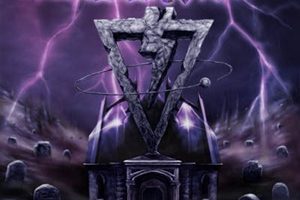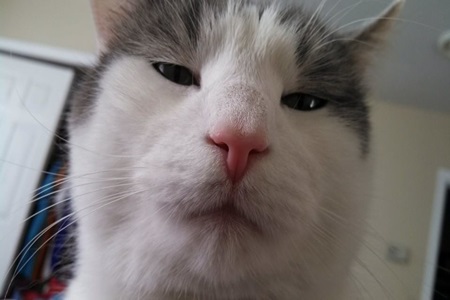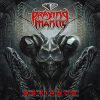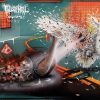Space Vacation – Emotional Reengagement
Friday, 3rd November 2017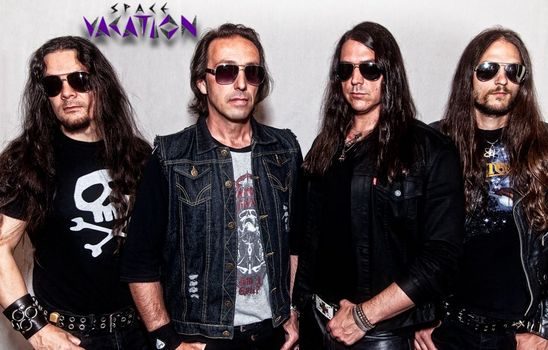
Caught between the edges of melodic hard rock and traditional metal, Space Vacation from California carve their own niche audience. One listen to their body of work and you’ll understand that catchy choruses and hook lines from both the vocal and musical sides are imperative to the band’s style. It’s the type of metal that embraces various 70’s and 80’s influences – from UFO to Iron Maiden, Thin Lizzy to Def Leppard and all the US/NWOBHM acts that sprouted up as a result.
Their fourth album Lost in the Great Divide comes out of a three-year period where the band would break up and reengage, assembling a new rhythm section in the process (welcome bassist Steve Hays and drummer Eli Lucas) while strengthening the resolve of vocalist/guitarist Scott Shapiro and fellow guitarist Kiyoshi Morgan. Expect bigger twin axe action, larger than life vocal harmonies, and a bit of riskiness in terms of expanding their horizons as far as influences while remaining 100% Space Vacation. It’s a record that will go down a storm for the old school mavens, and hopefully take in some newcomers as well.
Reaching out to Scott, we discuss the life events that took place between records, the band’s chemistry, thoughts on the traditional metal scene and its communal nature, as well as some honest talk about the changing tides within the music industry.
Dead Rhetoric: It’s been three years between album releases. Outside of changes within the lineup, were there any specific reasons for the longer gap between records?
Scott Shapiro: Yes. 2016 was a rough year for me personally. My mom had passed away, so there was a lot of time off with the band, so I could deal with issues back east. It just took a lot longer for the songs to come together. And ultimately, we decided to disband back in 2016 because things weren’t moving in any direction and frankly, I was just tired of trying to make it work with all the other things going on in life. Life just took over, and you can’t just do everything you want to do at the same time anymore. I pulled back, we had a good run, let’s just call it a day.
We had a bunch of songs that were just partially written, Kiyo and I just decided that now that we aren’t really doing the band thing, we felt that we would finish these songs as a springboard for a new band. We finished them, and found a couple of guys willing to record them with us since we already had the recording time booked. It came out great, and it sounded just like a Space Vacation album, so at the end of the day we decided to reform the band with a new rhythm section. Steve Hays who played bass on the record did such a great job we decided to keep him, and then we were really fortunate with Eli Lucas, who we were fortunate to play with for about a year and a half after our first drummer left, was available. He had been playing with Hatchet for (many) years and kind of burned out, and stopped playing for a bit. He wanted to come back into the fold and play drums with us, it was a good mix of people that had played before in the band so we decided to revive the band.
Dead Rhetoric: Lost in the Black Divide seems to advance Space Vacation’s style with bigger emphasis on the twin guitar harmonies and vocal melodies than ever before. How do you feel the songwriting and recording sessions went, and where do you see this release in terms of the band’s discography?
Shapiro: I think you nailed it. It really is kind of a step forward for us. I’ve always felt like we have been trying to find our sound. There was a big difference between Heart Attack and Cosmic Vanguard, and now Cosmic Vanguard to Lost in the Black Divide is a natural next step for us. We wanted to do a lot more with the vocal harmonies. To be frank I was never really happy with my vocal performance on Cosmic Vanguard– there were some things about it I felt were rushed, I didn’t feel like some of the melodies were quite what I was looking for. We were really pushing to get that album out, and spent a lot of time on the music, but the lyrics and melody lines had suffered because of that.
So with this album I wanted to focus on that aspect of that, and I feel like it came out in a way that it shows. I’m happy with how this came out as far as melodies and harmonies go. The twin harmonies are even more of a progression. I felt like on this album the complexity of those lines really changed- especially on a song like “Live by the Sword”- that’s something that we would have never thought to do three years ago.
Dead Rhetoric: What does producer Zach Ohren bring to the table that enhances Space Vacation and your output for the better?
Shapiro: An amazing ear. His understanding for sound and tone, it completed everything for us. This album was more of an experiment for us- typically we have been working with the same guys for a year plus to get the songs down the way that we wanted and record them. In most situations we would have played those songs out on (many) occasions before we went into the studio. This time it was nothing like that- we had played maybe one of the songs that are on the album live prior to the previous version of the band breaking up. We were playing things by ear- we had done a few demos between Kiyo and I, so we had an idea of what things would sound like, but Zach really brought things together and completed it. His sense of musicality really helped us.
I’ve known Zach for years- he played in a band called Midnight Chaser for (many) years that was based in San Francisco. I’ve obviously known some of the more high- profile stuff he’s also worked on – not necessarily in the genre we are in of more traditional music, but you can hear the professionalism and quality in everything he’s ever done. We knew the experience would be great- he’s an unassuming guy. I’ve been in studios where people are barking at you to do things better, he’s very clear in what is a good take, what is a bad take, and when he thinks you can do better without being abrasive. He creates a very nurturing environment.
Dead Rhetoric: Is it fair to say writing a song like “See You Again” for your mom who passed away in 2016, you encapsulated a lot of deep feelings and memories as a catharsis and tribute? What are some of your favorite memories with your mom as well?
Shapiro: Absolutely. I think that song dives into a few of (those memories). My mom loved Cape Cod, bought her dream house there and she died there. She lived life the way she wanted to, and was always extremely supportive of her sons- all three of us are musicians and all three of us at various times have played in Space Vacation, as both my brothers played bass at various times. I feel like the lyrics for this are all associated with this – not necessarily just “See You Again” which is clearly a tribute to my mom, but a lot of other lyrics on the album deal with loss and death. This record was a lot more personal to me- typically we try to keep things light and sing songs about beer drinking and fighting. But I felt with this album I had to get a little bit deeper to get these emotions out and get through.
Dead Rhetoric: I find there’s an interesting contrast in that song, as the guitar harmonies are very uplifting to the point of almost a California vibe going on…
Shapiro: That was definitely (on purpose). What I didn’t want to do was write a song for my mom that was sad and a bummer. My mom was very uplifting and full of life, and generally a happy person. I wanted the song to reflect that aspect of her personality and not to be saying goodbye, but until I see you again.
Dead Rhetoric: How did the idea come about for “Reason or Rhyme” with guest piano work from Edward Newton, as some of the guitar play and vocal melodies for this one has a throwback Queen meets 50’s/60’s rock feel?
Shapiro: Yes, that’s exactly what we were going for with that. I’ve known Ed since I was a child- in fact, we were together in our very first band together back in Tewksbury, Massachusetts. I’d always talked about trying to do something with him, and now that we are adults we have the opportunity to get the music in front of a wider audience. I was really happy when we started pinging back and forth on the internet the idea of a chord progression- what he could do with this on the piano, he would send a couple of different takes of where it was going. Once we got the structure solidified I brought it to the rest of the band, and they filled it in.
As far as Kiyo’s guitar work like Queen, that was absolutely intentional. We wanted to invoke that kind of feel from that song. We wanted to do something different- we didn’t want to necessarily play the same type of songs over and over again for every album. This was a good opportunity for us to spread our wings and do something completely different.
Dead Rhetoric: What can you tell us about the artwork for the new record?
Shapiro: I had an idea of what to do- but it was really difficult to come up with a name for this record. I don’t know why it was a challenge this time around- typically we will pick one of our favorite songs on the record, call it that, and move forward. With this one, we really liked all of the songs on the record- there was nothing we felt like we could have done better. For me, I had this feeling that this is an album of a catharsis about loss I wanted to have that as the marker for the record. I wanted a graveyard and I drew a small sketch of my idea for Sean (Walusko), and gave him the title to show him what I was aiming for. He was able to really pull it all together and turn it into something much cooler than I could have ever thought of.
Dead Rhetoric: Your record label Pure Steel seems to be stepping things up as far as developing a staff here in North America beyond the European stronghold they’ve established. What are your thoughts on their work, do you enjoy their roster and niche they’ve created?
Shapiro: You know, I’m grateful that they gave us an opportunity. As far as branching out here in the US, we haven’t really been affected by any of that. I like a lot of the bands that are on the label as well- I think they’ve got a good niche. But it would be a little better if we could get a little more publicity here in the states- I think you are the only US writer that has written about us. That has been a bit of a barrier to entry for us, that we can’t really get our foot in the door in the US- which in turn makes it more difficult to get into Europe, which is where we have a stronger following.
Dead Rhetoric: Where do you see Space Vacation in terms of audience acceptance in a West Coast scene well-regarded for a strong live music market? How does it feel to play with bands like Satan and Cauldron for instance – do you feel a kinship and connection through the power of metal and their takes on traditional metal?
Shapiro: The show we played last night was absolutely amazing. I’ve been a fan of Cauldron for some time. We were chatting with them last night, and they asked if they had ever played a show with us before. (Guitarist) Ian (Chains) started quoting some of our song lyrics back to us, he told us our CD has been in their tour van for years. It was a total super fan moment. I really enjoy playing with those guys, and Amulet- they were phenomenal, like a young Diamond Head. They blew me way. And having the opportunity to play with Skelator again, all of those guys are professionals. It is like a brotherhood- all these bands from all over the world get together, it’s a kinship we share. That’s what makes it worthwhile, because none of us are getting paid (well). It makes it a lot more personal, and the connections you make are more personal. And not just locally, but internationally- and that’s what makes metal so awesome.
It’s harder and harder for us than some other bands. A lot of bands are very genre specific and stick to their certain ideals as far as what they are performing, which is awesome. We have found that we are little too rock for the metal crowd, and a little too metal for the rock crowd. What’s really been interesting to me is I’m finding our audience that really digs what we do aren’t necessarily people that are ‘in the scene’. They are generally more just casual listeners that love the hooks and the catchiness of the songs. It’s almost more like a pop crowd, which is kind of funny.
Dead Rhetoric: How do you view the differences between your time in New England growing up and living in California these days?
Shapiro: I’ve been in California my entire adult life, so I guess the biggest difference is I am able to drink beer here, where I wasn’t able to out there (laughs). It’s warmer out here, the weather is nicer, people are generally friendly out here. Back east, people are a little bit more brash. There’s a reason why they called us Massholes for a reason. I don’t think I would choose to live back east again, starting with the weather. But there are a lot of things I miss about that part of the country as well. I feel like the metal scene is a little bit bigger there, probably a little more accepting. Whenever we tour back there, we seem to get good responses from the audiences. Where out here, the response can vary quite a bit, depending on the bill, the bands we are playing with, or the city.
Pages: 1 2













